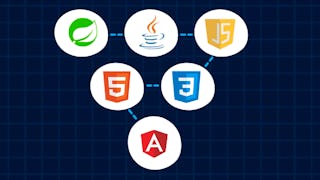Filter by
SubjectRequired
LanguageRequired
The language used throughout the course, in both instruction and assessments.
Learning ProductRequired
LevelRequired
DurationRequired
SkillsRequired
SubtitlesRequired
EducatorRequired
Explore the Mathematical Model Course Catalog

University of California San Diego
Skills you'll gain: Data Modeling, Big Data, Data Management, Database Management Systems, Real Time Data, NoSQL, Database Design, Apache Hadoop, Data Structures, Scalability, Virtual Environment

Board Infinity
Skills you'll gain: Angular, Web Applications, HTML and CSS, Web Development, Eclipse (Software), JavaScript Frameworks, Spring Boot, Object Oriented Programming (OOP), Restful API, Java Programming, Model View Controller, Object Oriented Design, Hypertext Markup Language (HTML), Front-End Web Development, Software Development Tools, Spring Framework, Java, Web Services, Javascript, Integrated Development Environments

Stanford University
Skills you'll gain: Healthcare Ethics, Data Ethics, Statistical Machine Learning, Applied Machine Learning, Machine Learning, Artificial Neural Networks, Healthcare Industry Knowledge, Health Care, Health Technology, Artificial Intelligence and Machine Learning (AI/ML), Reinforcement Learning, Supervised Learning, Health Informatics, Deep Learning, Data Processing, Data Quality, Image Analysis
 Status: Free
Status: FreeLudwig-Maximilians-Universität München (LMU)
Skills you'll gain: Finite Element Methods, Numerical Analysis, Engineering Analysis, Jupyter, Differential Equations, Applied Mathematics, NumPy, Mathematical Modeling, Distributed Computing, Python Programming, Mechanics, Vibrations, Linear Algebra, Simulations

University of Colorado Boulder
Skills you'll gain: Linear Algebra, Applied Mathematics, Data Science, Data Analysis, Statistical Methods, Algebra

Skills you'll gain: Feature Engineering, Applied Machine Learning, Statistical Machine Learning, Scikit Learn (Machine Learning Library), Predictive Modeling, Unsupervised Learning, Data Ethics, Machine Learning, Machine Learning Algorithms, Supervised Learning, Random Forest Algorithm, Data Analysis, Performance Tuning, Python Programming
 Status: Free
Status: FreeNational Taiwan University
Skills you'll gain: Autodesk Revit, Building Information Modeling, Autodesk, Construction Estimating, Simulation and Simulation Software, 3D Modeling, Construction Management, Data Integration

IE Business School
Skills you'll gain: Financial Policy, International Finance, Public Policies, Economics, Economic Development, Economics, Policy, and Social Studies, Market Opportunities, Business Economics, International Relations, Tax, Global Marketing, Policy Analysis, Socioeconomics, Demography, Business Risk Management, Crisis Management, Fiscal Management, Supply And Demand, Analysis, Financial Systems

University of Colorado Boulder
Skills you'll gain: Control Systems, Mathematical Modeling, Engineering Analysis, Differential Equations, Engineering Calculations, Systems Analysis, Electrical Systems, Mechanics, Applied Mathematics, Basic Electrical Systems

University of Illinois Urbana-Champaign
Skills you'll gain: Strategic Decision-Making, Team Management, Technology Strategies, Business Modeling, Innovation, Product Lifecycle Management, Business Strategy, New Product Development, Intellectual Property, Value Propositions, Competitive Analysis, Market Dynamics

Epic Games
Skills you'll gain: Unreal Engine, Game Design, Video Game Development, Animation and Game Design, Ideation, 3D Modeling, Prototyping, Visualization (Computer Graphics), Software Documentation, Software Design Documents, User Experience Design, Computer Graphics, Usability, Interactive Design, Virtual Environment, User Interface (UI) Design, Version Control, Conceptual Design, Web Content Accessibility Guidelines, UI Components
 Status: Free
Status: FreeSkills you'll gain: Telecommuting, Virtual Teams, Team Management, Human Resources Management and Planning, Culture Transformation, Performance Metric, Leadership and Management, Organizational Change, Organizational Strategy, Business Transformation, Organizational Leadership, Team Building, Performance Management, Adaptability, Communication
Mathematical Model learners also search
In summary, here are 10 of our most popular mathematical model courses
- Big Data Modeling and Management Systems: University of California San Diego
- Java FullStack Developer: Board Infinity
- Fundamentals of Machine Learning for Healthcare: Stanford University
- Computers, Waves, Simulations: A Practical Introduction to Numerical Methods using Python: Ludwig-Maximilians-Universität München (LMU)
- Essential Linear Algebra for Data Science: University of Colorado Boulder
- The Nuts and Bolts of Machine Learning: Google
- BIM Application for Engineers: National Taiwan University
- Globalization, Economic Growth and Stability: IE Business School
- Control Systems Analysis: Modeling of Dynamic Systems: University of Colorado Boulder
- Strategic Innovation: Building and Sustaining Innovative Organizations: University of Illinois Urbana-Champaign










